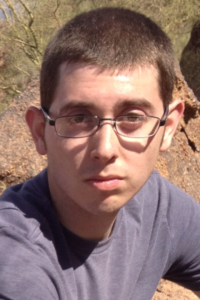 Jamie Acevedo is an Interview Editor at Superstition Review, and a senior in his final semester working towards a bachelors degree in English focused on Literature with a minor in Religious Studies. After graduation he aspires to attend an MFA program in a new part of the country, maybe the southeast or west coast, and work on his goal becoming an accomplished writer of fiction.
Jamie Acevedo is an Interview Editor at Superstition Review, and a senior in his final semester working towards a bachelors degree in English focused on Literature with a minor in Religious Studies. After graduation he aspires to attend an MFA program in a new part of the country, maybe the southeast or west coast, and work on his goal becoming an accomplished writer of fiction.
Jamie moved to Tempe from New York to attend Arizona State University to pursue his goal of studying literature and has found life in the southwest to be an enlightening experience. Originally focused on critical theory and literary criticism he discovered a passion for writing short stories in his freshman year and has recently started working on creative nonfiction and biographies. He loves reading literary magazines, which he was introduced to after taking a course on pursuing publication taught by Superstition Review‘s founding editor Patricia Colleen Murphy. This internship has provided him with an opportunity as an Interview Editor to work with authors he has been reading and studying in creative writing classes and really admires.
His personal definition of art is that it is a tool that allows human beings to communicate  abstract concepts and complicated emotions with each other. The writers who have had the biggest influence on him are those who seem to have made unique insights into the human condition. These include the short stories of Jhumpa Lahiri, Flannery O’ Connor, Stephen Crane and James Joyce and the novels of Robert Stone and Thomas Pynchon. He also enjoys novels that tackle religious and ideological themes like those of Fyodor Dostoyevsky and George Orwell. In addition to works of fiction he also enjoys reading essays on literary criticism, especially those on postcolonialism and reader response criticism.
abstract concepts and complicated emotions with each other. The writers who have had the biggest influence on him are those who seem to have made unique insights into the human condition. These include the short stories of Jhumpa Lahiri, Flannery O’ Connor, Stephen Crane and James Joyce and the novels of Robert Stone and Thomas Pynchon. He also enjoys novels that tackle religious and ideological themes like those of Fyodor Dostoyevsky and George Orwell. In addition to works of fiction he also enjoys reading essays on literary criticism, especially those on postcolonialism and reader response criticism.
 Outside of literature and writing Jamie enjoys sports, hiking, cycling and travel. After this semester he plans to spend time in Puerto Rico to visit family.
Outside of literature and writing Jamie enjoys sports, hiking, cycling and travel. After this semester he plans to spend time in Puerto Rico to visit family.